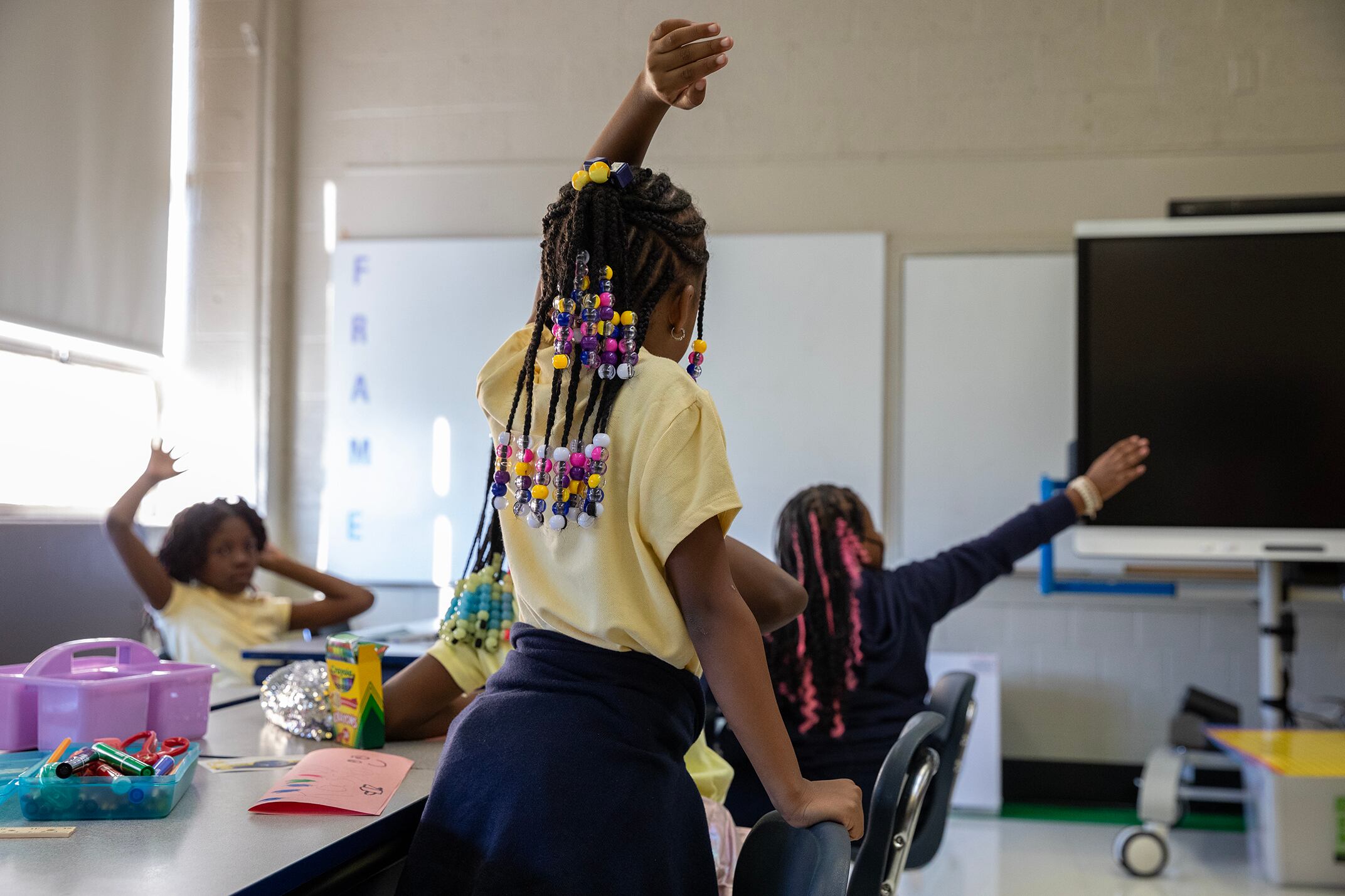With Democrats in control of the Michigan Legislature for the first time in decades, a number of education policy changes and priorities they have long fought for became a reality in 2023.
They include some reforms that educators and school administrators have pushed for as well, from a historic school aid budget that prioritized funding for students considered to be at risk, to the repeal of a retention provision in the third-grade reading law, to the elimination of the A-to-F school rating system.
“Educators for a lot of years said they agreed with some of the problems identified by the Legislature, but didn’t feel like they were listening to what was needed,” said Bob McCann, executive director of the K-12 Alliance of Michigan, which advocates for public schools. “On a number of these issues, the end result of this session in large part was that lawmakers were listening to what we were telling them was going to be the most effective way of addressing these issues.”
McCann said that compared with previous years of Republican control, the Legislature sent a clearer signal to educators that it was looking to better understand the needs of schools and how to best support them.
Most notably, this year’s school aid budget set the foundation for changing the way the state funds public education, following some recommendations from the School Finance Research Collaborative, which has developed a roadmap for more equitable school funding.
“It’s impossible to say we liked every piece of every bill, but the fact that there is a lot of input from educators and thoughtful discussion happening, I think is appreciated,” said Wendy Zdeb, executive director of the Michigan Association of Secondary School Principals.
Republicans and conservative advocacy groups viewed this year’s Democratic-backed policy changes differently, saying accountability and transparency were removed from classrooms.
“Whether it’s the adding of items to collective bargaining, educator evaluations, changes to the third-grade reading law, or the removal of school report cards, these are anti-student efforts,” said Beth DeShone, executive director of the Great Lakes Education Project, a school-choice advocacy group founded by Trump administration Education Secretary Betsy DeVos.
Molly Macek, director of education policy at the conservative Mackinac Center for Public Policy, said that in a record school aid budget, “very little was directed toward improving student outcomes and learning.”
Here’s a look at the key education measures that Gov. Gretchen Whitmer and lawmakers enacted this year, and one that’s making its way through the Legislature:
School aid budget boosts funding for the most vulnerable students
The $21.5 billion K-12 budget that passed in a mostly party-line vote in June was lauded by many education experts and advocacy groups as historic and groundbreaking, because it reflected an aggressive approach to recovering lost learning after the pandemic, particularly for the state’s most vulnerable students.
The budget allocated more money to special education, English language learners, and students from low-income households. Many supporters said it addressed “past wrongs” and failings by the state.
In addition to increasing overall per-pupil funding, the budget provided a new way to calculate funding for “at risk” students, setting aside $952 million to give schools 11.5% more money per eligible student.
And the budget included the $94.4 million for literacy programs that was promised to the Detroit Public Schools Community District to settle a 2016 lawsuit alleging that the state denied the city’s schoolchildren a basic education by failing to teach them to read.
Also funded in the budget were free school meals for all students.
Smaller ticket budget items also delivered money to benefit community-based advocacy efforts, education nonprofits, rural districts, and teachers. Among the beneficiaries were programs in Detroit that support student transportation and parent engagement.
Retention provision in third grade reading law is gone
In March, the Legislature voted mostly along party lines — with one GOP vote — to repeal part of Michigan’s controversial law that required third-graders who tested more than a grade level behind in reading to repeat the grade.
The law, which provided many ways for students to get exemptions, was criticized for its disparate impact on children from lower-income families and Black students, who were more likely to be held back than their white or wealthier peers who also struggled with reading.
Supporters of the repeal said holding back students didn’t help their learning outcomes and only did harm.
Defenders of the law said the prospect of retention helped boost test scores. But research on the issue is not conclusive, and suggests any improvement in test performance is short term.
Teacher evaluations delinked from student test scores
In November, legislators passed changes to the state’s teacher evaluation system that eliminated student test scores as a factor in teachers’ job performance ratings. Many educators hailed the change as a big win for teacher retention.
Under the previous system, as much as 40% of a teacher’s rating was based on student test scores. But little evidence emerged that the system led to better student outcomes.
Republicans largely opposed the change, saying it would lead to less accountability for individual teachers.
A-to-F school rating system eliminated
Lawmakers in May scrapped a law that required the state to assign A-to-F grades to schools.
Critics of the system, put in place in 2018, said it was redundant, because Michigan schools are already rated on a 1-to-100 scale to comply with a federally mandated accountability system. They also said the A-to-F grades stigmatized lower-performing schools and encouraged teachers to focus their lessons on standardized tests rather than broader learning.
Republicans had argued that a letter-based grade would be simpler for parents to understand than the 1-to-100 scale.
Teachers regain collective-bargaining rights
Under a bill Whitmer signed into law in July, teachers regained collective-bargaining rights that were stripped away by Republicans more than a decade before.
The change allows teachers once again to bargain on issues such as performance evaluations, staff reductions, teacher placements, discipline, and classroom observations.
The bill was a huge win for teachers unions, but some organizations representing school administrators and school boards opposed it.
McCann and Zdeb said their organizations have concerns over a provision that says seniority can be used as a tie-breaker in deciding teacher placement.
“A seniority-based system hurts young teachers and potentially puts teacher longevity over student needs,” said Zdeb.
Student-inspired bill to address sexual assault is now law
A law that requires Michigan schools to help students understand terms like “consent” and “sexual assault” passed with bipartisan support this summer.
The long-pending legislation was born out of an idea from a group of Detroit girls of color based on their own and peer experiences. The girls found that many of the kids they talked to didn’t know where they could find help or resources for sexual assault survivors.
In June, the Legislature passed a bill that amends state discipline law to protect public school students who report being sexually assaulted from being expelled or suspended more than 10 days in a school year.
According to research and testimony in favor of the bill, responses to trauma can often include behaviors that go against school policy.
Charter schools could face new disclosure requirements
A bill introduced in October would require Michigan charter schools to publicly disclose average teacher and support staff salaries.
Currently, those costs aren’t always clear in charter schools’ financial reports, because they can be lumped in with other expenses paid to for-profit management companies that operate most charter schools.
The State Board of Education has sought more clarity on how much public funding charter schools spend on educating their students, and how much goes to the private management companies.
McCann, from the K-12 Alliance, said the proposed bill is a good start to a larger, “long overdue” conversation on ensuring that charters operate by the same rules as traditional public schools. “Tax dollars are being spent and appropriated, and we need some accountability on the back end when these charter schools fail.”
Macek, from the Mackinac Center, agreed that “some level” of transparency for charter schools would be a positive, adding that she believes “it’s important to not be putting added regulations or restrictions” on the entities.
Hannah Dellinger covers K-12 education and state education policy for Chalkbeat Detroit. You can reach her at hdellinger@chalkbeat.org.






